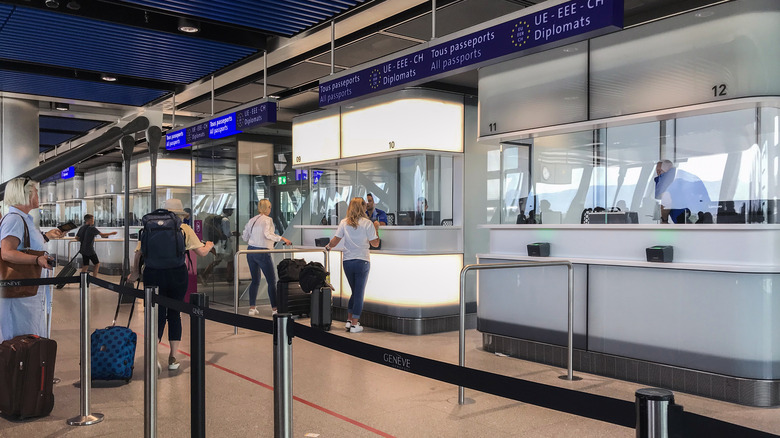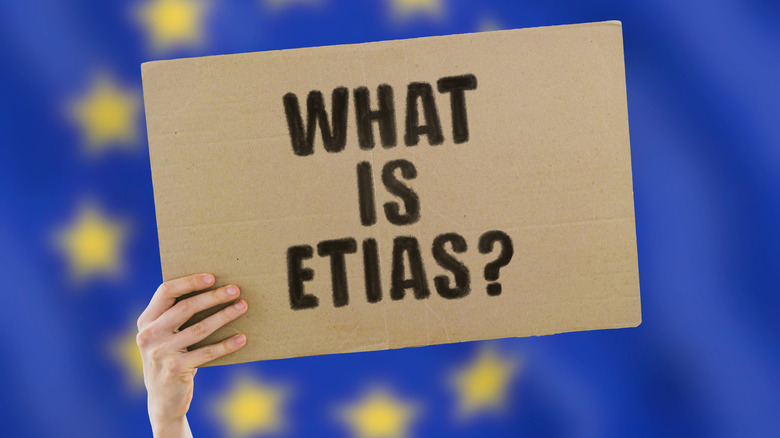What To Know About Europe Waiving Entry Fees Until 2025
Traveling to Europe will be slightly more expensive than usual; but due to recent developments, it turns out that the change won't be imminent. The European Union (EU) announced in October 2023 that its Electronic Travel Information and Authorization System (ETIAS) initiative won't take effect until the Spring of 2025, marking yet another setback following its initial projected launch in 2021.
To the uninitiated, ETIAS is a program that requires passport holders from visa-exempt countries, including the United States, to obtain an electronic visa waiver to be able to freely travel across the 27 nations part of the Schengen Area, as well as Bulgaria, Romania, and Cyprus. While it's not a visa, it's a travel requirement that permits its holders to enjoy brief visits to most EU countries for up to 90 days within a 180-day timeframe. The waiver is valid for three years or until your current passport expires, whichever is sooner. It also costs a measly €7 (or roughly $7.40) to apply, although individuals under the age of 18 or over 70 at the time of the application don't have to pay the fee.
The European Commission has been lobbying for the implementation of ETIAS since 2016 in an effort to strengthen security across the board and mitigate "irregular migration" from citizens of visa-exempt nations. Unfortunately, the program has met countless delays, with the latest one being caused by technological glitches.
Why has the ETIAS implementation been delayed yet again?
The ETIAS program is closely linked to the Entry/Exit System (EES), another EU automation effort that replaces the manual stamping of passports for travelers coming from non-EU nations. Like ETIAS, EES has also experienced unforeseen delays, resulting in the postponement of its rollout. While EES can run on its own, ETIAS cannot function without EES, so any setbacks faced by EES directly affect ETIAS.
"ETIAS relies on data provided by the EES for the identification of risks, such as security, irregular migration, or high epidemic risks," Anita Hipper, EU Commission's Spokesperson for Home Affairs, said in a statement in March 2023. However, EU's Justice and Home Affairs Council revealed in an October 2023 press release that the IT agency responsible for these interdependent systems needed more time to work out the kinks. "The new roadmap for the delivery of the new IT architecture foresees that the Entry/Exit system will be ready to enter into operation in Autumn 2024 and that ETIAS will be ready to enter into operation in Spring 2025," they noted.
The 2024 Paris Olympics is reportedly a factor for the delay as well. In March 2023, France called for the postponement of EES to ensure the smooth entry of travelers arriving in the country for the event. "This is our position, and it's not just linked to (passengers coming from) the U.K., but also the risk of congestion at airports," an EU diplomat told The Local.
What else to know about ETIAS
While you don't have to allocate a small part of your budget to ETIAS applications just yet, it's still important to familiarize yourself with the program to better plan your future travels. According to the official ETIAS website, non-EU tourists are encouraged to obtain their ETIAS authorizations even before finalizing flights and accommodation plans. While approvals will typically issued "within minutes," some individuals may be asked to supply more information or be subject to an interview, delaying the process further, sometimes up to 30 days.
During the application process, ETIAS applicants are asked to provide various information, including passport details, educational attainment, occupation, and past criminal convictions, should there be any. It's also important to understand that being in possession of an ETIAS does not ensure automatic entry to any EU country. The agents at the border still have the final say on whether or not they will permit you to enter their territory.
In the event that your ETIAS application has been denied, it could be due to an invalid or tampered passport, insufficient documentation, or being recognized as a security risk. Individuals who have been rejected will receive a document detailing the grounds for denial. They will also be given the chance to file an appeal.


